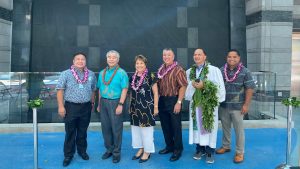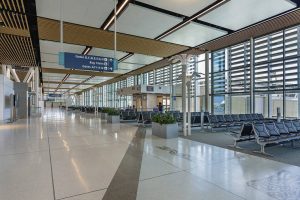Investing in infrastructure for an enduring legacy
Posted on Dec 30, 2021 in Capitol Connection, Featured, Main
Officials at the blessing of the new Consolidated Rental Car facility at the Daniel K. Inouye International Airport. (From left): HDOT director Jade Butay, Governor Ige, Sen. Lorraine Inouye, airports deputy director Ross Higashi, Kahu Kordell Kekoa and Rep. Henry Aquino.
The Hawai‘i Department of Transportation has been an essential part of the state’s COVID-19 response — from helping to improve the travel experience at airports and making sure goods kept flowing through the state’s harbors to keeping highways in good repair throughout the state. Of major significance are the several modernization projects completed this past year, including the Mauka Concourse at the Daniel K. Inouye International Airport (HNL), the Federal Inspection Service facility at Ellison Onizuka Kona International Airport, and the Consolidated Rental Care facility at HNL. Also the Kapalama Container Terminal, Phase 1, was dedicated in March, culminating decades of planning. As an island state that imports over 80% of goods consumed (99% of which pass through the state’s harbors) Hawai‘i depends on its air and sea transport as a lifeline for everyone.
Reaching more people through broadband – The pandemic highlighted the need for every resident to have access to reliable and reasonably priced broadband service. The Emergency Broadband Benefit Program has helped a wide range of low-income families access discounted internet service. Currently more than 17,000 Hawai‘i households are enrolled in the program, amounting to more than $3 million in benefits for island residents. From January 2022, the program will be called the Affordable Connectivity Program and will continue to provide subsidies on internet services for qualifying families. See https://www.fcc.gov/broadbandbenefit for details. The first phase of providing free broadband internet service at select Hawai‘i Public Housing projects will continue into 2022 through the state Department of Transportation.
Other major state initiatives included the completion of the $160 million State Hospital forensic mental health facility and the efforts to resite and rebuild the Oahu Community Correctional Center. The Department of Public Safety harnessed nearly $1 million in federal funds to purchase PPE for its corrections and law enforcement employees and conducted regular COVID-19 testing of inmates.
